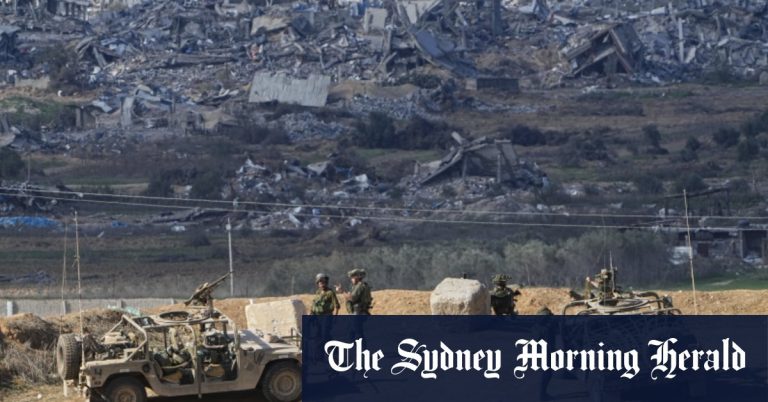But it did not rule out the possibility of Israel committing genocidal acts. In imposing “interim measures,” the court found that concerns about the possibility of genocide merited further review.
It called on Israel to “take all measures within its power” and “to ensure with immediate effect” that its army does not commit acts of genocide, including those that cause unnecessary Palestinian death or human suffering.
He also called on Israel to prevent “public incitement to commit genocide,” referring to a series of inflammatory statements by Israeli leaders. It ordered Israel to submit a report to the court within one month on the steps it is taking to meet these demands.

Pro-Palestinian activists wave flags during the International Court of Justice hearing in The Hague.credit: AP
The court said it was deeply concerned about the fate of the hostages and called for their immediate and unconditional release. But the resolution focused almost entirely on the plight of Palestinian civilians in Gaza and urged Israel to do more to facilitate the entry of humanitarian aid.
Yuval Shani, an international law expert at the Israel Democracy Institute, said the ruling was “not great” but it could have been worse.
“The conclusion that South Africa’s claims are reasonable is not good,” he said. “But this is something Israel can live with.”
The war continues
There is nothing in the court ruling that legally obligates Israel to stop the war.
Israeli leaders pledged to press ahead with the offensive, insisting that they already abide by international law and are committed to allowing humanitarian supplies into the besieged area.
Prime Minister Benjamin Netanyahu criticized the genocide allegations as “outrageous,” noting that the ruling came on the eve of International Holocaust Remembrance Day. Netanyahu indicated that Hamas, which killed 1,200 and kidnapped 250 on October 7, seeks to destroy Israel.
Barak Medina, a human rights expert at the Hebrew University School of Law, said the ruling's battlefield implications were “marginal.”

Israeli soldiers take up positions near the Gaza Strip border.credit: AP
He said calls to increase humanitarian aid and suppress incitement may have some small policy impacts. He added: “But regarding the main aspect of the military operation, one does not expect any change on the ground.”
Increased scrutiny
As Israel advances on the battlefield, the ruling shines an additional bright and critical light on the Israeli attack.
The war, launched by Hamas in response to the October 7 attack, has killed more than 26,000 Palestinians and led to widespread destruction, displacement and disease, according to local health officials and international relief agencies.
The United States, Israel's closest and most important ally, has repeatedly expressed concern about the number of civilian deaths, and the broader international community has repeatedly called for an immediate ceasefire. The tough language adopted by the court, coupled with the requirement to report to it, has increased global scrutiny and puts more pressure to scale back or stop the attack.
Merav Michaeli, leader of the opposition Israeli Labor Party, described the ruling as a “yellow card” against the government, which she said was “causing enormous international damage to the country.”
A former head of the Israeli army's international law department said the decision would worsen Israel's global standing and undermine the legitimacy of the war.
“It's a huge threat,” said Pnina Sharvet Baruch, now a senior researcher at the Israel Institute for National Security Studies. “It also ultimately impacts our national security. We need our allies. “We can't manage here alone.”
download
Pressure on the United States
Despite its concerns about harm to civilians, the United States has so far supported the Israeli war effort, protecting Israel from international criticism and continuing to provide weapons to the military.
The ruling draws unwelcome attention to the US position — one that has put it at odds with its allies and threatens to damage President Joe Biden's standing with the progressive wing of the Democratic Party as he seeks re-election.
The Palestinian Foreign Ministry said: “States now have clear legal obligations to stop the genocidal war waged by Israel against the Palestinian people in Gaza and ensure that they are not complicit.”
She said the interim ruling “should serve as a wake-up call to Israel and the actors that have enabled it with impunity.”
The ministry is part of the Palestinian Authority, the internationally recognized autonomous government in parts of the West Bank occupied by Israel. The United States said it wants to see the authority that was ousted by Hamas in 2007 return to power in Gaza after the war.
“The historic decision puts Israel and its allies on notice,” said Balqis Jarrah, associate international justice director at Human Rights Watch, a New York-based group that has accused Israel of committing war crimes in past rounds of fighting.
“The court’s clear and binding order raises the stakes for Israel’s allies to uphold their stated commitment to a rules-based global order by helping to ensure compliance with this watershed ruling,” she said.
AP
Get a direct note from our foreign correspondents on what's making headlines around the world. Subscribe to the weekly What in the World newsletter here.

